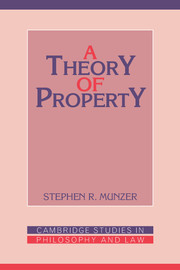Book contents
Preface and acknowledgments
Published online by Cambridge University Press: 05 June 2012
Summary
I hope that this book will aid our theoretical understanding of property, taken as a topic in moral, political, and legal philosophy, though it is hardly the ultimate truth on this matter. I also hope that, to the extent that the views argued for here are sound, they will serve as a basis for action to make institutions of property better than they now are. At a time when, in most of the countries of the world, a few have great material wealth and others are struggling for the scantiest material resources, making the case for better property institutions is not an optional intellectual endeavor but a practical imperative.
The book is intended for those whose interests lie in philosophy, law, political theory, the social sciences, and corporate organization. The text has been written to be accessible to students in these disciplines. The notes – which are extensive by philosophical standards – enable the reader not only to find support for assertions and arguments in the text but also to identify literature that develops or in some cases disagrees with my own views. Unfortunately, Jeremy Waldron's The Right to Private Property (Oxford: Clarendon Press, 1988) came into my hands only as this book was going to press, and I have not been able to take his study into account.
Almost anyone who writes a book of this kind incurs many debts. First and foremost I am indebted to my students.
- Type
- Chapter
- Information
- A Theory of Property , pp. ix - xPublisher: Cambridge University PressPrint publication year: 1990

